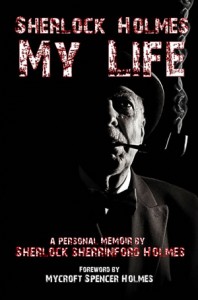Republished by Blog Post Promoter
Audio performance by Steven Cooper.
Content of this 15 minute audio presentation:
1) FORWARD: by Mycroft Holmes
2) AN OPEN LETTER FROM SHERLOCK HOLMES
“I address this letter of introduction to the following monograph, written by my own hand. I have undertaken to commit this autobiographical revelation of the factual events of my life to writing, at the suggestion and encouragement of my best friend in the world, my brother Mycroft Holmes. The written record of my adventures as conveyed by Dr. John Hamish Watson, rather than myself, as you will read herein, are a fallacious perversion of the reality of my own identity and activities. – Sherlock Sherrinford Holmes”
A biography of Sherlock Holmes.
Republished by Blog Post Promoter
Audio performance by Steven Cooper.
Content of this 15 minute audio presentation:
1) FORWARD: by Mycroft Holmes
2) AN OPEN LETTER FROM SHERLOCK HOLMES
Republished by Blog Post Promoter
I love to listen to audio books! It allows me to “read” a book while doing other things, like driving, walking, shopping, washing dishes, vacuuming the floor, doing the laundry, feeding the cat, working out at the gym, sitting outside on the patio, and other “mindless” activities that require very little attention. I listen to one audio book every week, or more. You can get a very affordable monthly subscription from www.Audible.com. Every month you can download one or more books and listen to them on your phone, iPod, iPad, computer, or MP3 player. Try it for FREE for one month!
Republished by Blog Post Promoter
Arthur Conan Doyle’s son, Adrian, is interviewed about this father’s 35 year investigation into the subject of life after death. (1968)
 “Any truth is better than indefinite doubt. It was easier to know it than to explain why I know it. If I were asked to prove that there is a life after death, I might find some difficulty in it, and yet I am quite certain of the fact.”
“Any truth is better than indefinite doubt. It was easier to know it than to explain why I know it. If I were asked to prove that there is a life after death, I might find some difficulty in it, and yet I am quite certain of the fact.”Republished by Blog Post Promoter
Republished by Blog Post Promoter
“”‘What sort of people live about here?’
‘In THAT direction,’ the Cat said, waving its right paw round, ‘lives
a Hatter: and in THAT direction,’ waving the other paw, ‘lives a March
Hare. Visit either you like: they’re both mad.’
‘But I don’t want to go among mad people,’ Alice remarked.
‘Oh, you can’t help that,’ said the Cat: ‘we’re all mad here. I’m mad.
You’re mad.’
‘How do you know I’m mad?’ said Alice.
‘You must be,’ said the Cat, ‘or you wouldn’t have come here.’
Alice didn’t think that proved it at all; however, she went on ‘And how
do you know that you’re mad?'”
 “So, Mr. Dodgson, let me pose the same question to you that young Alice asked of the chimerical cat in your own story: how do you know whether you are mad or not mad? How would you satisfy yourself that I am not mad? How do we know that everyone is mad or not mad?”, I said, rising from my chair to place the manuscript upon the sideboard.
“So, Mr. Dodgson, let me pose the same question to you that young Alice asked of the chimerical cat in your own story: how do you know whether you are mad or not mad? How would you satisfy yourself that I am not mad? How do we know that everyone is mad or not mad?”, I said, rising from my chair to place the manuscript upon the sideboard.
I refilled my pipe once again, in anticipation of the protracted debate that was sure to follow on the heels of these profoundly absurd, yet existential queries and arguments.
Mr. Dodgson did not seem the least bit nonplused by my insinuation regarding his sanity, or the sanity of all. Rather, he thanked us very cordially for our hospitality, rose from his chair and reached the door to exit the apartment. As he reached the door he turned back to me.
“Mr. Holmes, I will leave the resolution of this mystery entirely in your very capable hands. If anyone were able to solve the questions you pose to me, I assure you that I am not that man. Neither are any of the mentors whom I have studied, including Sir Isaac himself. I trust that you will be kind enough to inform me of your eventual success, if such is possible. Good day to you, gentlemen”.
With that, he departed, clomped down the stairs. Through the window we saw him walk briskly away through a light drizzle of rain in the direction of the train station.
“What do you make of it Holmes?”, asked Watson, who seemed to have been disquieted by our visitor. “I must admit that our meeting with this gentleman is the most perplexing I have ever had,” he said, resuming his seat in front of the fire.
“Yes. Most perplexing, indeed”, I agreed, taking my own seat and refilling my pipe. “Most perplexing.””
— Excerpt from SHERLOCK HOLMES: MY LIFE, by Lawrence R. Spencer